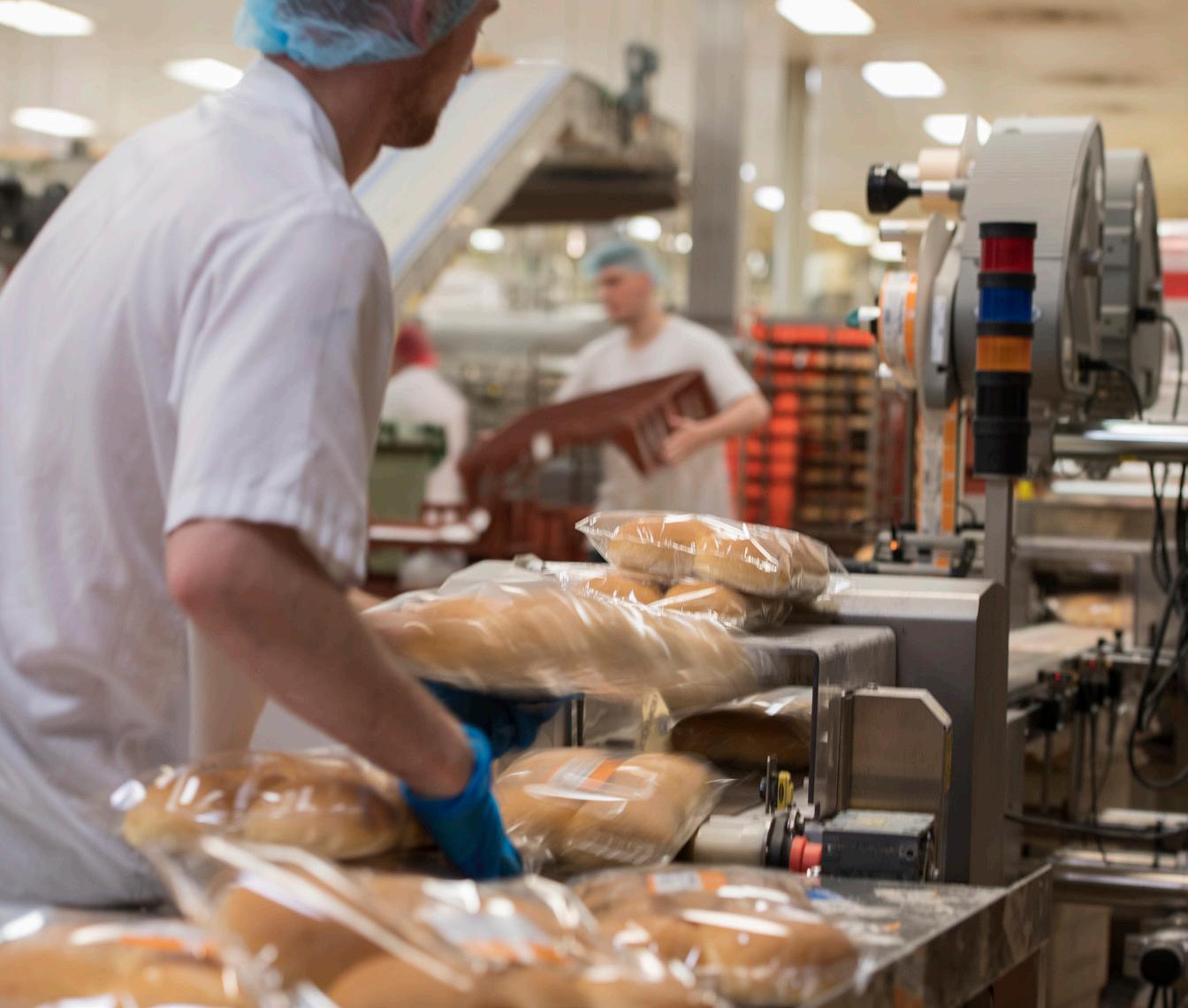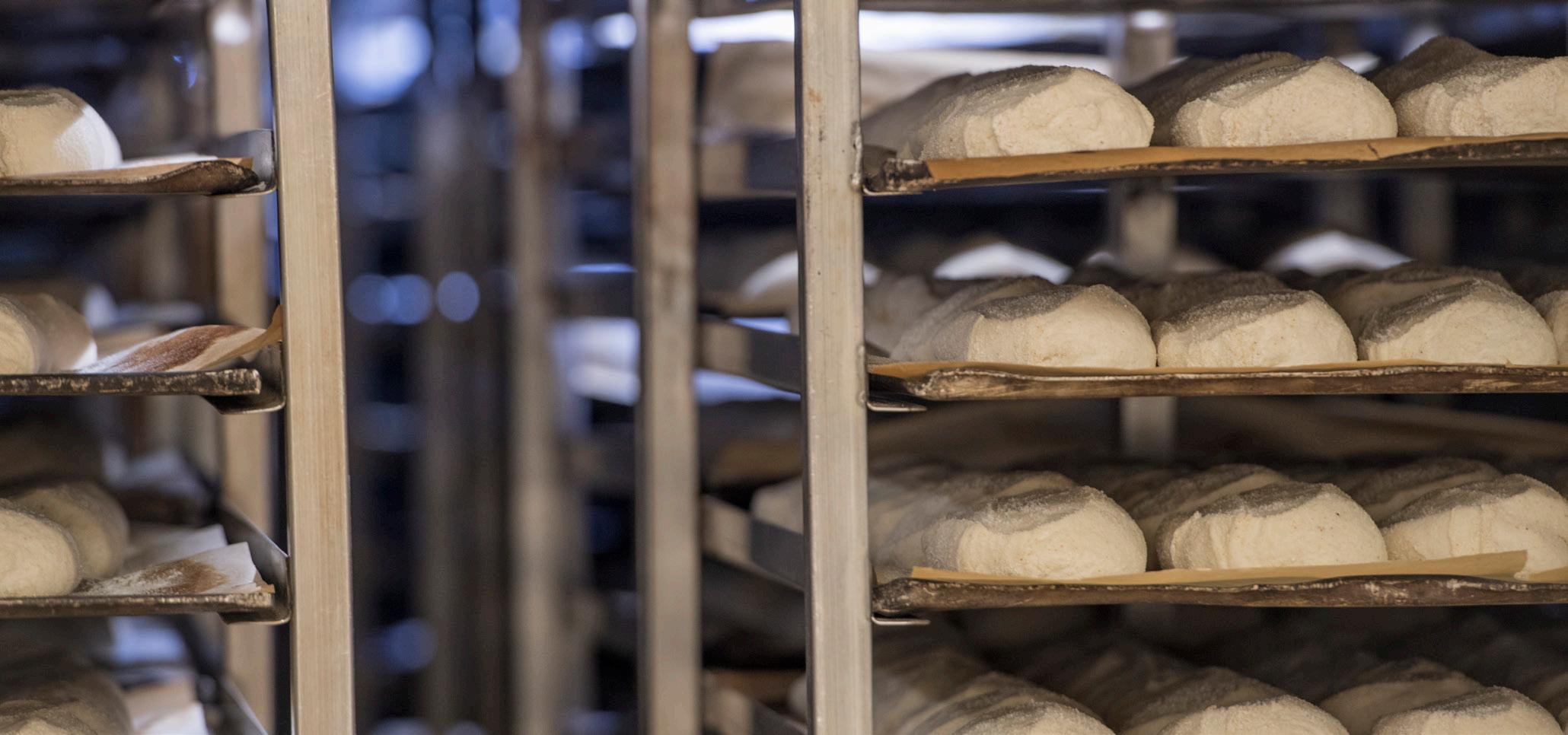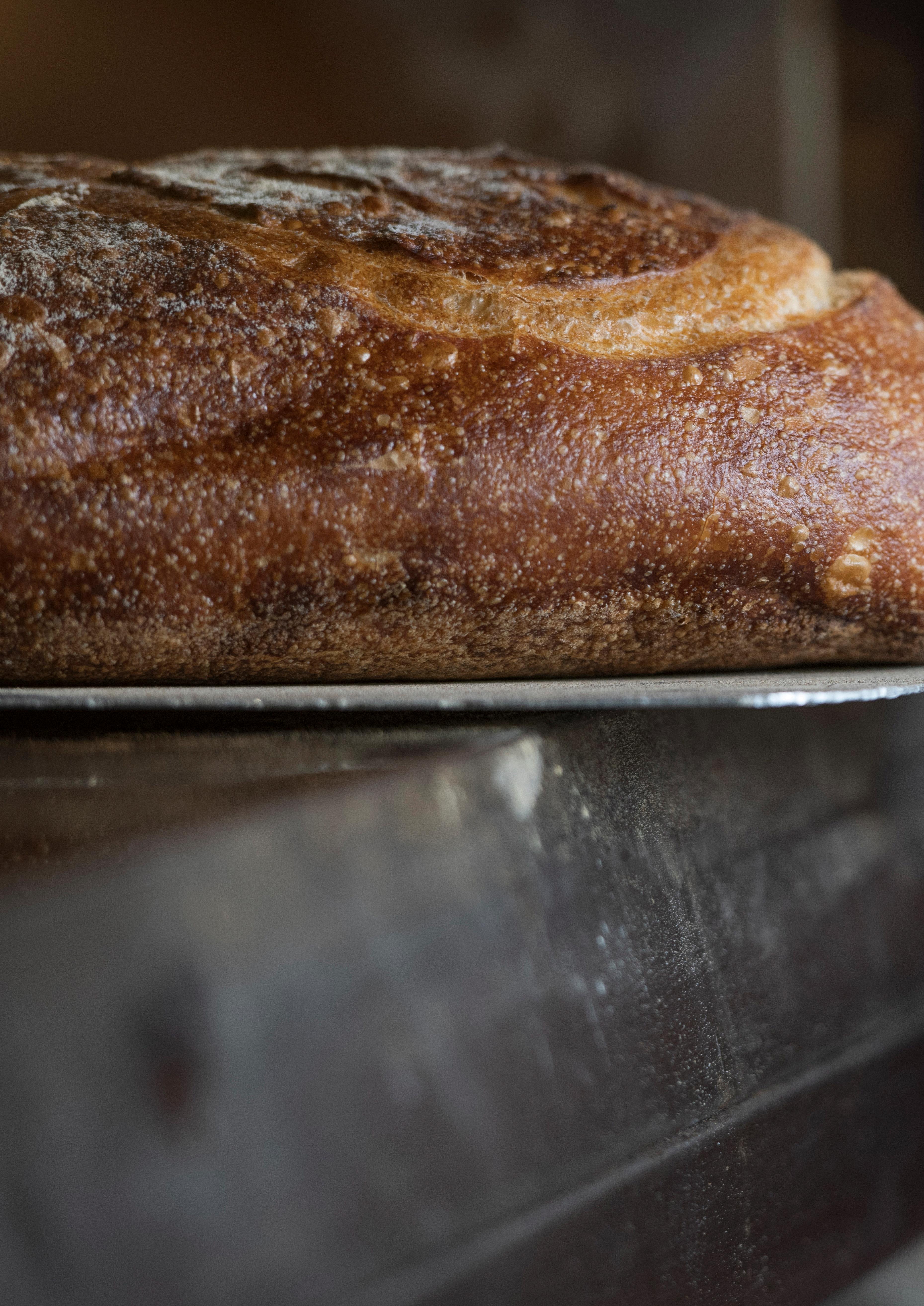
11 minute read
Focus on training
FOCUS ON TRAINING ANNUAL REPORT & YEARBOOK 2018/2019
NATIONAL FOOD AND DRINK TRAINING (NFDT) IS THE TRAINING ARM OF SCOTTISH BAKERS. WE SPECIALISE IN THE PROVISION OF APPRENTICESHIPS AND OTHER SKILLS AND TRAINING PROGRAMMES TO THE UK’S FOOD AND DRINK MANUFACTURING INDUSTRY.
Advertisement
HERE WE BREAK DOWN OUR ACTIVITY ACROSS SCOTLAND, ENGLAND, AND NORTHERN IRELAND OVER THE PAST YEAR.
Scotland The 2018/19 financial year funding allocation awarded to Scottish Bakers was £648,757, with 432 funded places on the Modern Apprenticeship (MA) programmes. We concluded the contract on March 31st 2019 having drawn down £697,225 in funding. £26,750 of this funding was obtained from Skills Development Scotland’s Rural Uplift Initiative to aid training provision in more remote parts of Scotland. We also registered 436 candidates onto Modern Apprenticeship pathways within the Food & Drink sector. The quality of our training activities and its subsequent success is carefully monitored and measured by our awarding bodies, funders, and stakeholders. All external assessments were positive, highlighting areas of good practice and examples of our “above-and-beyond” attitude. “Learners and employers spoken to within the latest Matrix Standard Assessment were all very positive about the information, advice and resources provided to meet their needs, from staff with a background in the industry who understand the business demands and accommodate these. One example given was the flexibility of Training Advisors to visit out of hours for those on shift work, another being the additional help provided by Advisors to help people towards successful achievement, whether through more contact time, in-depth explanations in certain areas, or signposting to useful web links and other resources.” Sue Harding, Matrix Standard “Very impressed by the teaching observations and the visit to Belfast bakery, very positive feedback from the employer and apprentices in relation to the quality of the provision, noting the outstanding achievement and progression rates across the Level 2 & Level 3 profile for the reporting period. The Inspector also noted that the employer highlighted that Emmanuel and the apprenticeship programme have been instrumental to the development of the company.” ETI Inspector Northern Ireland
“The overall feedback from apprentices and “
Our candidate registrations were broken down into the following MA Pathways:
1 2 3
7
6 4
5

1. 26% undertook Food Sales & Service Skills 2. 20% undertook Food Manufacture Excellence 3. 19% undertook Craft Bakery Skills 4. 15% undertook Food and Drink Operations 5. 13% undertook Production & Processing 6. 3% undertook Dairy Skills 7. 4% undertook Distribution Skills
FOCUS ON TRAINING ANNUAL REPORT & YEARBOOK 2018/2019
The overall feedback from apprentices and employers was positive with close working professional relationships being maintained between Scottish Bakers staff and apprentices throughout the learning journey. The Scottish Bakers team are clearly invested in the development of skills within their sector and pride themselves on their solid reputation as a provider of Modern Apprenticeship (MA) provision in Scotland. The Scottish Bakers team are very experienced within their industry and are clearly engaged and motivated to provide a good learning experience for their apprentices.” Skills Development Scotland (SDS) Quality Assessor
“The Centre staff possess a wealth of experience within the food & drink industry and in delivering Food Manufacturing Excellence/ LEAN awards, and all are very enthusiastic. The standard of support materials is very high and the feedback from the candidates and employer on the site visited was excellent.” Scottish Qualifications Authority
“Training advisors determine apprentices’ starting points and prior knowledge accurately. They use this information well to plan programmes with employers that enable apprentices to be successful. Training advisors work effectively with apprentices to prepare them for their end-point assessment and to help them complete their qualifications. Almost all apprentices make the progress expected of them. Training advisors provide high-quality teaching and one-to-one sessions for apprentices. These focus appropriately on the science and craft of high-quality baking techniques and system fault-finding. Apprentices gain a thorough understanding of all aspects of the baking sector and develop their skills to work in the industry. For example, they improve and apply their knowledge about the accuracy of recipes and maintaining and checking the serviceability of equipment used in the sector.” Ofsted Retention rates for our apprenticeship programmes remain a key metric for our stakeholders. We calculate the retention rate by subtracting the number of learners who do not complete qualifications from the number of learners who started the qualification. This is then calculated as a percentage. Our overall retention rate in Scotland for the year gave NFDT a programme success rate of 81.30% against an SDS benchmark average of 78%. Over the course of the year, 348 candidates achieved their Modern Apprenticeship through Scottish Bakers, further enabling sustainability within the sector. And looking to the future, Food Manufacture Excellence (FME) MAs continue to grow as employers seek to streamline and become more efficient in their own manufacturing and production processes.
FOCUS ON TRAINING ANNUAL REPORT & YEARBOOK 2018/2019
ENGLAND We are now only contracted to deliver apprenticeships to levy-paying employers - those with a wage bill in excess of £3m a year. This has proven to be challenging and has forced us to undertake a review of our training delivery in England. The result was a change in approach and structure. We parted ways with our selfemployed associates and instead hired our own training advisor to aid delivery on a full-time basis.
This has coincided with a radical rethink of how training is delivered within the workplace in England, and we are continuing to adjust our delivery methods to suit. With such upheaval, there has been an inevitable downturn in England. We had 44 learners on the programme over the past year - 17 of whom have achieved, with a further 27 still live at the time of writing. However, retention rates are very encouraging: 84.09% against a benchmark of 62%.

NORTHERN IRELAND We’re pleased to report that our partnerships with Belfast Metropolitan College (BMC) and the Northern Ireland Bakery Council (NIBC) are set to continue as we work together to deliver industry proficiency qualifications. Our current success rate sits at 84% against a national average of 76%. Work continues on the full framework with BMC as we seek to identify refinements that fit with work-based apprenticeships.
FOCUS ON TRAINING - AN EMPLOYEE’S PERSPECTIVE ON APPRENTICESHIPS ANNUAL REPORT & YEARBOOK 2018/2019
J. B. CHRISTIE STEPHEN JOHNSTON
STEPHEN JOINED J.B. CHRISTIE IN 2016 AFTER A PERIOD OF UNEMPLOYMENT FOLLOWING A SERIOUS KNEE INJURY. Previous employment with a burger chain ensured he had a basic grounding in the demands of the food sector, and so he found the move into a commercial bakery relatively straightforward. Stephen began working in the bakery’s washroom, before taking on wider responsibilities for cleaning and hygiene throughout the bakery and starting to volunteer to help the bakers with their duties.
I’M NOT SEEN AS JUST THE CLEANER, BUT AS SOMEONE WHO CAN HELP OUT WITH A BROAD RANGE OF TASKS...” - Stephen Johnston, J.B. Christie Joining the Apprenticeship Programme Stephen put himself forward to join Christie’s apprenticeship programme as he was keen to develop himself. “I am really motivated and keen to learn more about baking, so I thought it was important to push myself forward for the apprenticeship,” says Stephen. Owner, Andrew Chisholm agrees, “Stephen takes a lot of initiative in the bakery to help others and to ensure he gets experience of all the different parts of our work in the bakehouse.” Stephen’s Learning Journey Previous experience of working towards a vocational qualification ensured Stephen understood how the process of learning and assessment worked, and so this aspect of the process was familiar. “The paperwork and assessments were all quite straightforward,” said Stephen. “I just had to make sure I managed my time as effectively as possible so that I could have the work ready when the trainer visited.”
Improved Performance Stephen says the clearest benefit is understanding why he must do certain tasks, rather than just knowing what they are. Having a wider understanding of what goes on across the bakery also means that colleagues view him differently. “I’m not seen as just the cleaner,” says Stephen, “but as someone who can help out with a broad range of tasks and who is keen to learn baking skills.” Confidence and Ambition The programme has helped to build Stephen’s confidence in his own abilities, and he is now far more ambitious as a result. He is planning to continue his development and is keen to learn more about the bakery’s range of products and develop his career.

ANNUAL REPORT & YEARBOOK 2018/2019 FOCUS ON TRAINING - AN EMPLOYEE’S PERSPECTIVE ON APPRENTICESHIPS
UIN FOODS MARTIN STEWART: TEAM LEADER, TOPPINGS
MARTIN HAS BEEN WITH UIN FOODS SINCE EARLY 2017, FOLLOWING MANY YEARS IN THE RETAIL SECTOR. He began working in the packing section and spent around 12 months in that role when he was offered an opportunity to join the company’s Modern Apprenticeship programme along with a transfer to the toppings section of the production line. Martin commented, “the apprenticeship came up at the right time for me and the way my role was changing.” Practical approach Martin was initially a little concerned about the commitment required from him to undertake certain aspects of the apprenticeship in his own time. Despite these reservations, Martin agreed to sign up and he very quickly began to appreciate that the work required at home was manageable. Perhaps more significantly, Martin began to see that he had been given an important development opportunity. “As I worked through the units, I began to see how it related to my job and I understood that this was really going to benefit me as I developed my skills and knowledge,” said Martin.
YOU NEED TO FIND THE RIGHT ANSWERS FOR YOURSELF INSTEAD OF RELYING ON SOMEONE TELLING YOU WHAT THE ANSWERS ARE. THIS HELPS YOU TO RELATE ALL THE LEARNING TO THE JOB YOU’RE DOING.” - Martin Stewart, Team Leader, Toppings, UIN Foods Relevance Martin was surprised at how different it was working towards his SVQ and apprenticeship from his previous educational experiences. “It’s not like sitting in a classroom and I found that hard to begin with,” he says. “The way it works with the trainers makes you challenge and stretch yourself much more. You need to find the right answers for yourself instead of relying on someone telling you what the answers are. This helps you to relate all the learning to the job you’re doing.” From his initial doubts about the programme, Martin is happy to admit that he very quickly developed a very positive attitude to the apprenticeship and fully committed himself to completing it. Performance and responsibility Martin was promoted to Team Leader, Toppings as he worked through his apprenticeship, and he says that it directly helped him to be far more aware of all the important parts of this job. In his words, “the process made me more mindful of my responsibilities.” He is clear in his belief that working towards his apprenticeship had a wider positive impact on the rest of the line too, contributing to maintaining high-quality products, minimising waste and maximising productivity. In short, “everyone benefits.”

Lessons learned Martin says that one of the biggest lessons was a personal one; that to get the most out of the programme for his own benefit he had to accept there was additional work and commitment required from him. He felt that this opportunity helped him develop a more mature attitude to his working life. As for the practical side of the training, Martin felt the focus on hygiene was a vital aspect of the programme, and again he says this is all about ensuring the highest possible quality at all times. Martin commented, “I’m now totally focused on hygiene, health and safety matters at work. They’re all essential for efficient operations and a clean end-product.” Personal growth Martin readily admits his attitude to work and learning has changed over time. He says his personal approach is far more positive and he has more ambition for his future. He can now see that there are opportunities for natural progression if he works towards them and he is hopeful that with the right opportunities and the right approach he can secure a supervisor role and eventually a managerial role. The training experience Martin was quick to credit Gary Steele, Training Advisor, at National Food and Drink Training with supporting him through the programme to a successful outcome. “Gary was approachable and friendly at all times, but also made sure he challenged me to find the right path to success – he helped me though the process, but didn’t ever make it easy on me,” said Martin. Overall, Martin believes the programme has helped him develop both personally and professionally. He is better and more committed to his job, feels a stronger sense of loyalty to Uin Foods and has greater ambitions for the future.




